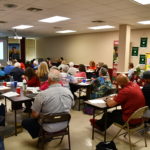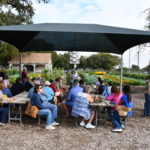Master Gardeners throughout Texas receive vegetable specialist training
Three-day training in San Antonio included classroom, outdoor learning
Writer: Paul Schattenberg, 210-859-5752, paschattenberg@ag.tamu.edu
David Rodriguez, 210-631-0400, dhrodriguez@ag.tamu.edu
Dr. Larry Stein, 830-278-9151, larry.stein@ag.tamu.edu
SAN ANTONIO – Texas Master Gardeners from throughout the state recently converged at the Texas A&M AgriLife Extension Service office in Bexar County for a three-day training toward their certification to become vegetable specialists.

“We had 42 individuals from 22 different counties attend the training in San Antonio,” said David Rodriguez, AgriLife Extension horticulturist for Bexar County and a program coordinator and presenter. “They came to the training to learn all about vegetable gardening so they could support educational outreach through the AgriLife Extension offices in their respective counties. Some ways they will do this is by helping in school and community gardens, giving community presentations on backyard gardening and even helping with vegetable research and demonstration activities.”
Rodriguez said participants completing the training will receive certification once they complete 20 hours of approved vegetable-related outreach efforts through their county coordinator.
The first two days of training were classroom presentations by AgriLife Extension experts, Master Gardeners who already received vegetable specialist certification and others involved in horticulture-related activities in their various counties.
“What really impressed me about everyone attending this training was that they were all doing it for others,” said Patty Leander, a Travis County Master Gardener who was one of the presenters.
Leander, who has been a Master Gardener for almost 20 years in Harris and Travis counties, also writes for Texas Gardener magazine and The Masters of Horticulture web blog.
“Every one of the attendees was asked why they were here and every one of them said they were here to take the knowledge back to their communities to help with community horticultural projects or teach others what they learned so they could benefit,” she said. “And with the American diet the way it is today, everybody should be eating more — not fewer — vegetables.”
During the first day of classroom training, attendees learned about growing vegetables the Earth-Kind way, using minimal chemical inputs; site selection, soil testing and plant nutrition; soil preparation and fertilization; hybrid, open-pollinated and heirloom vegetable plants; watering, weed management and mulching and integrated pest management.
Second day presentations addressed harvesting and preserving vegetables; common vegetable diseases; and specifics of growing various types of vegetables, including different cole crops and leafy greens as well as onions, tomatoes, peppers, potatoes, eggplant, beans, squash, sweet corn, cucumbers, okra and Southern peas. Presenters also gave instruction on growing strawberries, watermelons, cantaloupes and pumpkins.
“Since the summer crops are pretty much done, we tended to focus more on cole crops and other cold-weather crops,” said Dr, Larry Stein, AgriLife Extension horticulturist, Uvalde. “But while the types and timing for planting may differ, the principles of soil preparation and plant care are pretty much the same. We’re hoping everyone who attended the training will work closely with the AgriLife Extension agents in their counties to provide educational outreach.”
Leah McIntosh, a four-year Travis County Master Gardener who attended the training, said she planned to share the information about vegetable gardening with others by providing home gardening seminars and working in school teaching gardens.
“The training helped me by providing me with a lot of useful information about things like composting, fertilization and plant maintenance,” McIntosh said.
Another attendee, Tony Lucenti, a seven-year Master Gardener from Jefferson County, said he was going to take the knowledge acquired at the training and apply it toward enhancing two donation gardens in Beaumont.
“We have two community gardens, one of them at my church, with 47 raised vegetable garden beds combined,” Lucenti said. “These gardens provide fresh vegetables for seniors through the local Meals on Wheels program. Through that program, we provide fresh produce from the gardens directly to seniors for them to use in their own meal preparation. At this training, I’ve learned techniques I can use to help make these gardens more productive and sustainable.”

The final day of the training, participants toured the Culinary Garden and Children’s Vegetable Garden at the San Antonio Botanical Garden.
“We’ve been partnering with the botanical garden on the Children’s Vegetable Garden for about 13 years and now we consider it one of the nation’s flagship children’s vegetable gardens,” Rodriguez said. “It’s also one of the oldest children’s gardens in the U.S. and has been in operation for about 35 years.”
He said the Children’s Vegetable program has two 16-week programs – one in the spring and one in the fall – in which area youth learn to plant, tend and harvest their own vegetables and learn about nature and gardening through Master Gardener instructors using the agency’s Junior Master Gardener curriculum.
Henry Brune, a five-year Bexar County Master Gardener who attended the training, is one of the local Master Gardeners involved in the Children’s Vegetable Garden.
“I help with maintaining the garden and even do some cooking for the community event we hold here for the children and their friends and family,” Brune said. “My goal is to take what I’ve learned in this training and help make gardening a success for everyone.”
Michelle Hobbs, of Boerne, another training participant who volunteers at the Children’s Vegetable Garden, said she too was interested in applying the training she received to benefit young people. Hobbs, who has been a Bexar County Master Garden for less than a year, is also a Texas Master Naturalist.
“It feels good to work with kids and to see them get excited about growing their own vegetables,” Hobbs said. “I also like to share the nutritional and health aspects of vegetables and how young people can benefit from being outdoors and enjoying nature. Plus, they learn life skills that can benefit them, such as patience, persistence, focusing their attention and taking personal responsibility.”
At the end of the training participants received a certificate of participation and a variety of cold-weather crop transplants to take back to their respective counties.
“I hope everyone got a lot out of the training, and I know everyone who attended will share what they learned and will spread that knowledge and the joy of vegetable gardening to others in their counties,” Rodriguez said.


